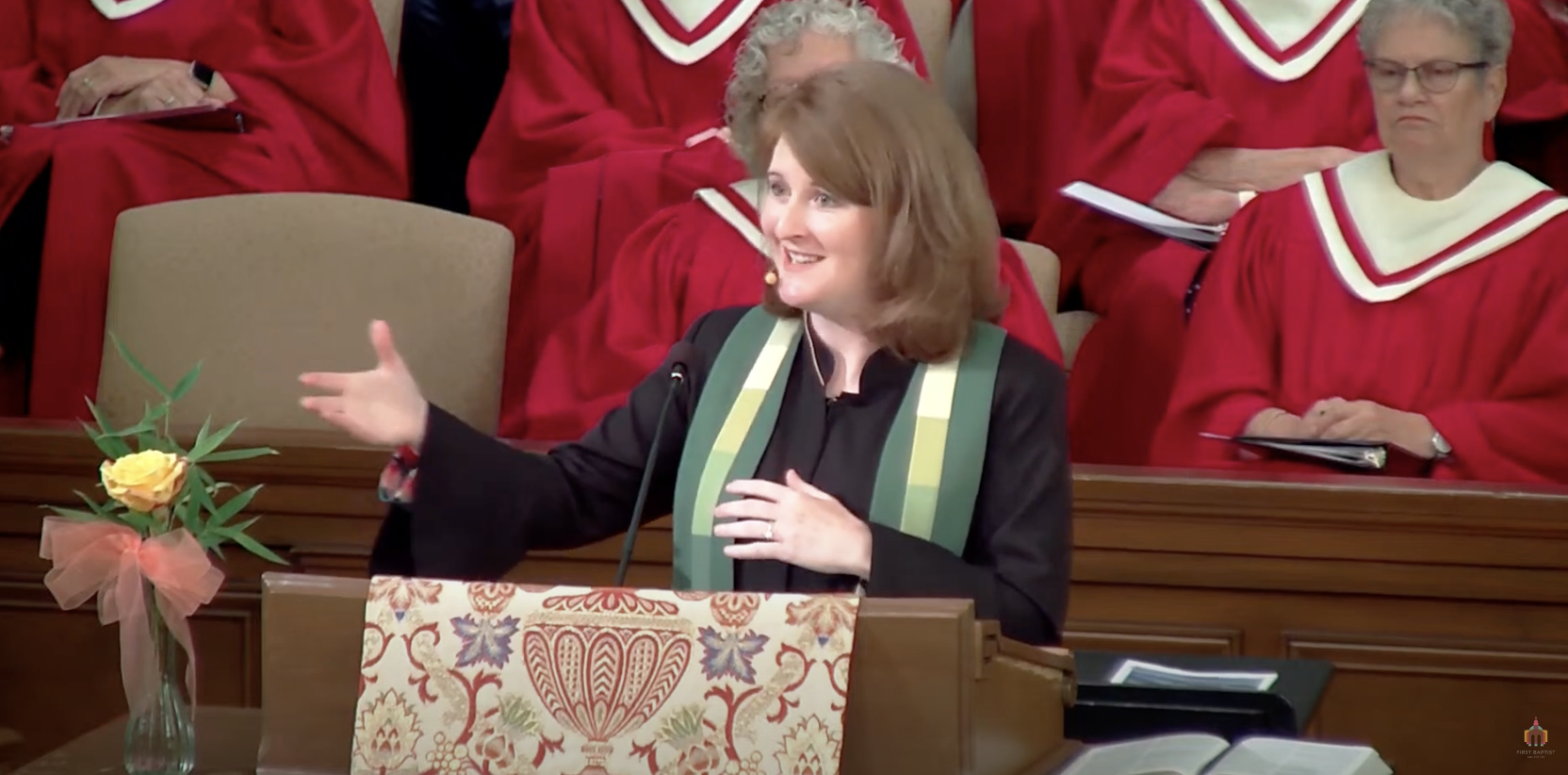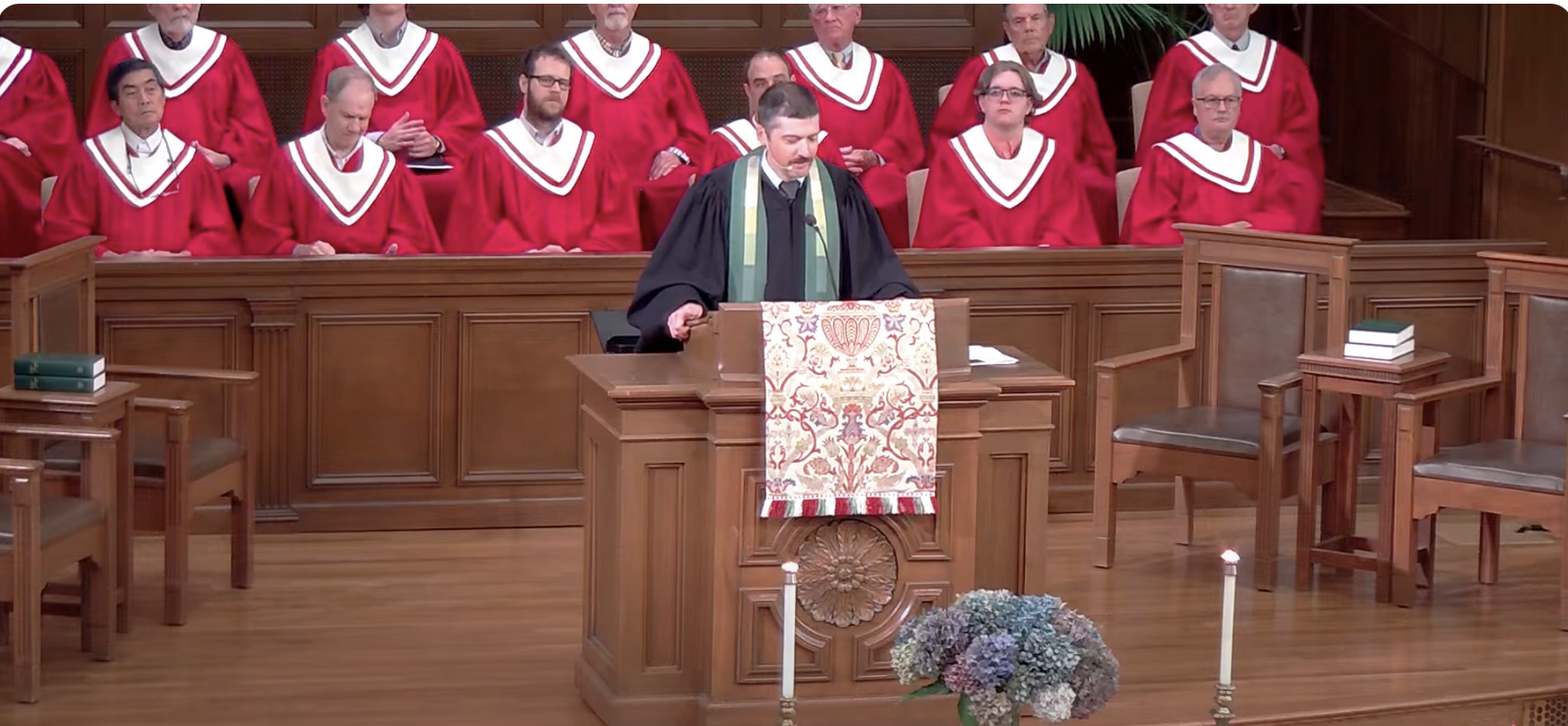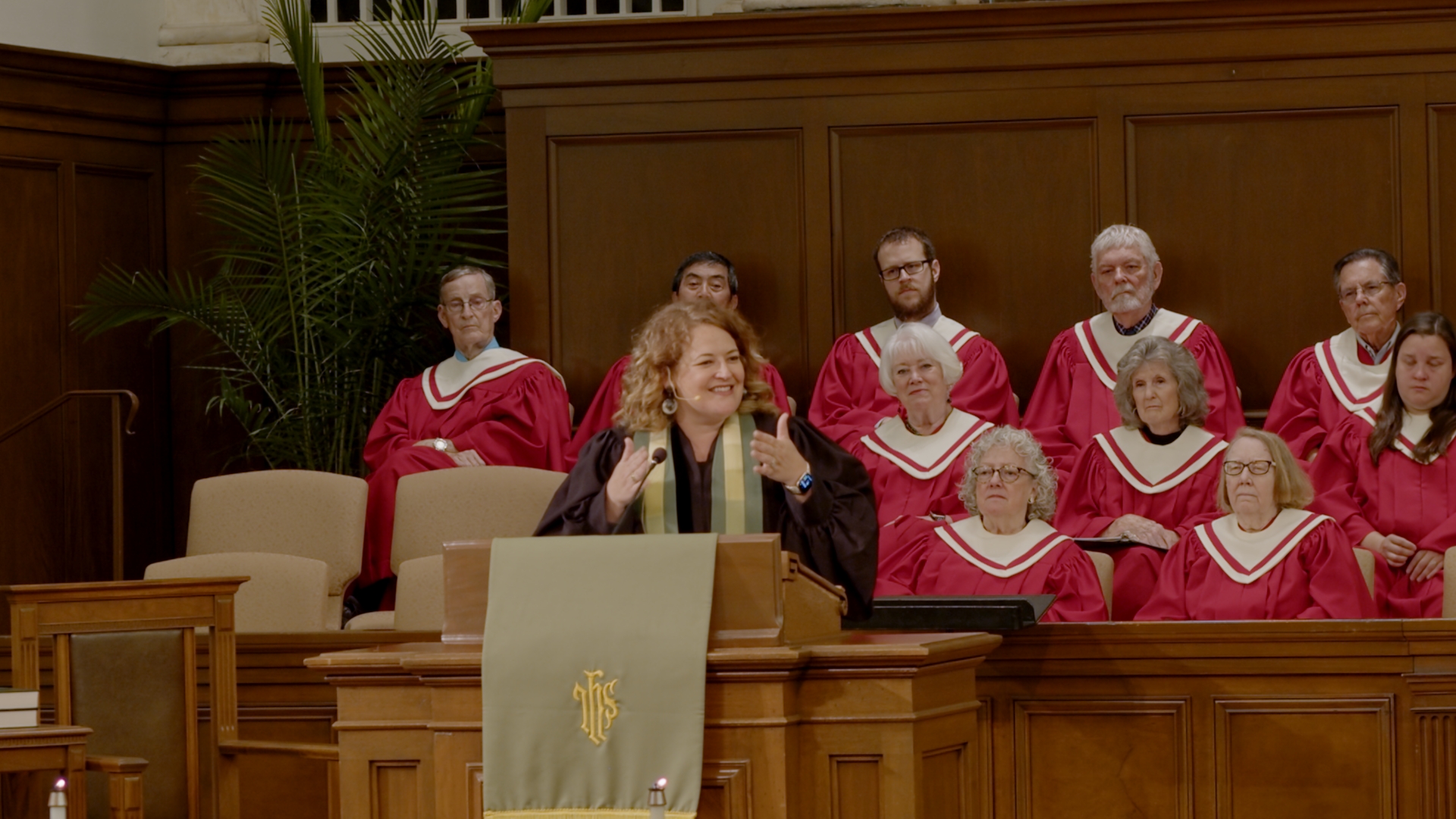I must begin by noting the title of this sermon—“Defying the Norms: The Risks of Getting Political”— was chosen months ago. The assassination attempt yesterday at the former president’s rally in Pennsylvania is now on our hearts and minds. We pray for the victims. We pray for a country already deeply divided. And now faced with political violence—fear, uncertainty, and anger abound. I invite you now to join me in prayer that God may calm our spirits.
I.In the sweltering mid-summer we’re all looking for a break from the heat. Beach reads. Baseball. Blockbuster movies. Many of us have relaxation on our minds. But like that crazy cousin who crashes your relaxing summer vacation, the lectionary today has other plans. Like a prophet crying in the wilderness, this story of John the Baptist’s beheading by Herod Antipas is jarring—buzzing like an alarm clock meant to wake you up from your mid-summer slumber.
It’s a tale as old as time. A king or ruler rises up to power and then must do anything to keep it. There are many ways to do this: Some tell lies. Some refuse to step down. Some seek to silence anyone that stands in the way. There are many ways of getting rid of some one who is a threat—from pulling the strings behind the scenes (the administrative way)—to more punitive ways—the most extreme being violence. The norm in this story for those beneath the leader—whether we call them the “subjects” the “underlings” or “the people”— whether we call them the “employees” or “colleagues” or even “the congregation”— the norm in this story is to stand by. Stand by and survive. To endure the king or ruler’s power, you go along with the unjust system by “just trying to get by.” “Just outlive the bad leader.” Keep your head down. Stay silent.
From an early age we hear and see stories of those who “stand out” or “speak out” too much. It doesn’t end so well. They lose their jobs or lose their friends or get expelled from the community. At worst, they lose their lives.
This is the story of a toxic kind of politics that affects all kinds of institutions and groups: nations, corporations, organizations, even churches and families. What binds the one in power to those under their power is fear. Fear that often festers in silence.
What if I am the lone voice crying in the wilderness?
What if no one else stands with me?
This culture of fear doesn’t only affect those at the bottom—it affects the anxious leader too. The leader fears losing power at all costs; those under the leader fear how that power may be used against them—not only by the leader, but by those who also fear the leader. And the fear compounds. And the people cling to silence as their solace. As Audre Lorde reminds us: “your silence will not protect you.”
Thankfully, there are those few who do break their silence. Who speak out not only against of the bad reign of the power-hungry leader (calling out the problem is necessary) but who also imagine a different kind of reign—a different way of being. They help us imagine a world held together not by fear, silence and suspicion, but by love, community, and peace.
There is a greater way than fear, my friends, a greater way than silence. There is a greater way being made by God, a way of love—a way of community—a beloved community. It is the prophets who speak out, not simply to call out what is wrong but to point us back to the way forward— for it has been present all along—“at hand” as Jesus would say for all who dare see it and speak it and live it. The prophets share a hard truth, a tough pill — but this challenging word contains our freedom and our healing.
We who are so often silent need to hear that voice crying in the wilderness.
I’m interested here—in what it might take to be a little more fearless and a little more risky in following the God who is Love—those of us who claim to follow Christ. I’m interested in what it might take to speak up and stand up for all that is good and just and beautiful.
And we Baptists really have no excuse. As Baptists—our name goes back to the practice instituted by this John the Baptist the one who was beheaded in this story today! What kind of faith might it take to be a little more fearless and a little more risky? Perhaps taking a closer look at John the Baptist could prepare us for such faith.
II.John the Baptist shows up on the scene at the beginning of Mark chapter one where he “appeared in the wilderness, proclaiming a baptism of repentance and the forgiveness of sins.” John shows up on the scene and immediately in Markan fashion gets to work. As we have seen in the past few weeks in this gospel, Mark moves things along. Most of the stories are quick and shorter than the versions told in Matthew and Luke—gospels that share much in common with Mark. Mark’s few verses describing John tell us a lot about him and his ministry:
1) John is committed to baptism of repentance as a new way of life
2) confession & forgiveness of sins / which preparing people for Jesus
John calls people to a new way of life and provides rituals to do so. According to the text, this drew great numbers. John’s popularity was also noticed outside of the text. The Jewish historian Josephus writes that people “came in crowds about him, for they were very greatly moved [or pleased] by hearing his words..” So much so that Herod feared that John may use his great influence over the people to raise a rebellion. The prophet speaks, the people follow, and the anxious ruler senses a threat.
Mark also gives descriptive details about John’s wild appearance—wearing animal hides and eating wild foods. We never get a “physical” description of Jesus in the gospels, so we can assume Jesus looked like any ordinary Palestinian man of his time. Not so with John the Baptist. That Mark—the shortest gospel—includes physically descriptive details about John’s clothing (camel hair and leather belt) and even John’s eating habits (locusts and wild honey)—seems intentional. John looked different and he was calling people to be different. Silence was not John’s thing. In his appearance and in his message John the Baptist was making a point.
After John baptizes Jesus, the only other detail we get of John the Baptist until chapter 6 is a verse in chapter 1 telling us that “John was arrested.” Mark spends less than 10 verses on John’s ministry and then spends almost double that regarding John’s death in chapter 6.
III.In this series on “Defying Norms” Emily Hull McGee has talked about what scholars call the “Markan Sandwich”- where Mark places one story between two other stories as a way of drawing meaning by comparison and contrast. The story of John’s beheading comes between two other stories—the mission of the 12 disciples and the feeding of the 5,000. In the first Jesus sends out his disciples “two by two” giving them the power to cast out unclean spirits (i.e., restore people’s souls). They are also healing people. And get this, Jesus’ disciples are preaching that “all should repent.” The disciples of Jesus sound a lot like John the Baptist — calling for repentance (Greek: metanoia) or “turning around.”
Now after such great works, such early ministry success, you can imagine the disciples are ready to celebrate: “Jesus, look what we’ve done!” “Look at the success we’ve had!” “We did what we’ve seen you do!” But rather than throw a party to celebrate the success of Jesus’ disciples, Mark shares about a different kind of party—one where disciples of Jesus or John would never be invited. This is the party of Herod Antipas the client king of that area. No prophets allowed.
The Herods were a dynasty known for their opulence. They had massive summer palaces built that they would never even visit. Their great aqueducts and building projects including the temple—all were demonstrations of their wealth and power. When I traveled to this region a couple years ago I was able to see these structures with my own eyes. Like skyscrapers or tanks or fighter jets today—these structures communicated who was in charge. All this power and wealth yet the Herods were paranoid – they had their own family members killed whenever if they sensed another member was a threat to their power. I was able to visit the pool in Jericho where a Herod the Great had his own son drowned. This brutality was so well-known that the Romans said it was safer to be Herod’s pig than Herod’s son (the Herods did apparently keep Kosher).
This being the historical context, it’s no surprise that Herod Antipas could have a prophetic rabble-rouser like John the Baptist arrested or even killed—especially when John is publicly calling out his lack of morals and violation of Levitical purity laws. However, John’s preaching delighted Herod and our scripture says that Herod was “perplexed” by John. It’s as if Herod was torn between the truth of John and the lie of power—choosing to believe the lies power tells.
As Mark tells it, Herod threw himself a birthday party and was entertaining the social elites of Galilee. Herod—never the one for subtlety—tells stepdaughter Salome or Herodias in front of the guests: “Ask me for whatever you want… even half my kingdom.” She asks her mother what she should ask for and immediately comes back to Herod with the startling request: “The head of John the baptizer.” Herod is apparently appalled at this request, but did not want to look “weak” and immediately ordered the the beheading of John and the guard brings back John’s head on a platter.
The politics of this text are unavoidable. Here a political leader orders the execution of John the Baptist. Mark includes an interesting reason for Herod having John arrested and later killed. It was because John was critiquing Herod based on the purity laws of Leviticus — where a man is not permitted to marry his sister in law. Why the religious critique of Herod? There were many grounds to critique Herod’s brutality. This critique of Herod by John on Jewish grounds reads better as a warning for the early church: Herod is not a true follower of God’s ways. The religious critique is a reminder for the early Christians to avoid the conflation of any political leader as the bearer or defender of the faith. This jab at Herod is a warning for the church against what we would now call “religious nationalism.” Leaders may claim to have faith, they may carry bibles, they may put the 10 commandments on the walls, but John says look at their actions. The Herods were publicly religious but spiritually bankrupt. This text serves as a reminder to followers of Jesus then and today that we have a different kingdom and a different king—a different kind of politics.
It is the prophets among us — standing up and speaking up — calling us to see a more good, just, peaceful, and beautiful way. Not to preserve our own power, but to use what power we possess to lift up those who this world beats down.
Too often we avoid the prophetic task because we think it means something too big for any of us to really do. Who am I to change the world? Who am I to fix injustice? I wonder if reaching too big is another means of silencing our prophetic task as Christians. We talk ourselves out of standing up for anyone because we think we have to stand up for everyone. We talk ourselves out of speaking up about something because we think we have to speak up for everything. But it starts with where you are.
IV.This past week I was with our students at Passport camp. During worship our students were asked to consider one injustice that they cared about and believed they could do something to address. One of our students wrote that an injustice she sees is when she sees people being treated unfairly. Students were then asked to write about what they could do to address this injustice. Our student wrote she could stand up for them. Speak up for them. This is an action-oriented response to Christ’s call from one of our very own students. This is a teenage prophet in the making.
What could God be calling you to stand up for?
Who could God be calling you to stand up for?
What could God be calling you to speak up for?
Who could God be calling you to speak up for?
Standing up and speaking up is risky. It defies the norms of complacency, silence, and inaction. Yet the stories throughout the gospel of Mark remind us that despite the risk—despite what happened to John—despite what happened to Jesus—the faithful community of disciples continued to take risks because of God’s bold love.
At the end of this passage we are told that when John’s “disciples heard about [John’s death], they came and took his body, and laid it in a tomb.” Imagine the boldness of these followers of John to go to Herod (the one who had just had John killed) and demand that his body be given to them so they could give him a proper burial. They risked big because of the call they heard and the new life they lived because John prepared the way for Jesus. That kind of bold faith is much needed for us today. We need a faith grounded in something more lasting than the election cycle, more hopeful than the headlines—serious as the situation at hand may be. Our hope is in something greater, someone greater. We need those among us, young and old, those at the center and those at the margins to stand up, and speak up—as did John the Baptist —preparing the way of our Lord Jesus the one who came proclaiming good news for the poor, for release of the captives, for restored sight to the blind, and liberation for the oppressed, and God’s favor for all.
May God give each one of us enough faith to risk a little more, to fear a little less. To stand up. To speak up. For when we do, God stands up and speaks up with us, in us, and through us. Amen.







